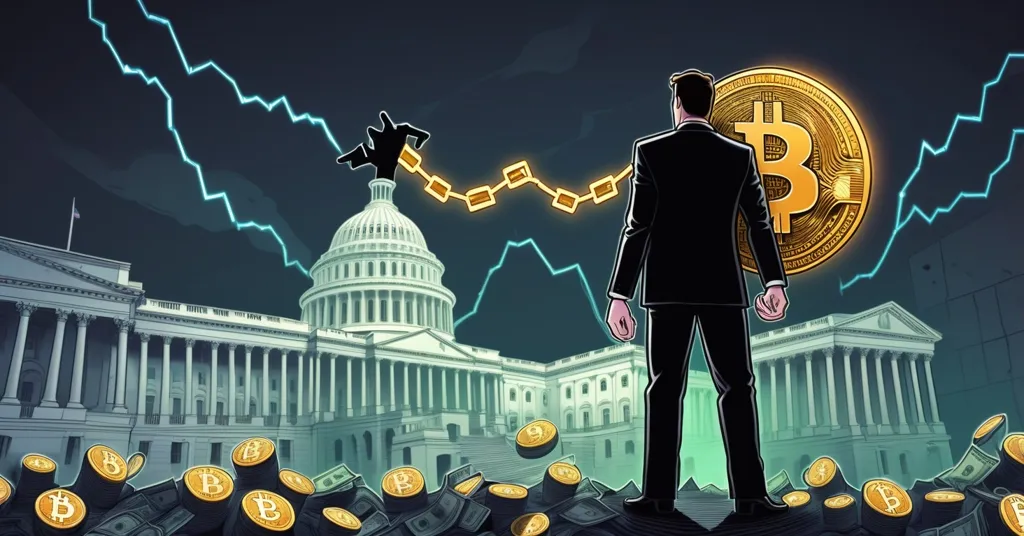Rep. Brandon Gill’s Bitcoin Trades Spark Insider Trading Fury Under STOCK Act

US Lawmakers’ Shady Market Plays: Bitcoin, STOCK Act Violations, and Rep. Brandon Gill’s Suspicious Trades
Bitcoin’s core promise of financial sovereignty takes a brutal hit when US lawmakers pull market moves that reek of insider trading. Rep. Brandon Gill, a fervent Trump ally, has landed in hot water with Bitcoin purchases worth up to $850,000, timed eerily close to major crypto policy reveals from President Trump, all while blatantly ignoring federal disclosure rules under the STOCK Act.
- Gill’s Bitcoin Haul: Up to $850K in purchases, with late disclosures breaking STOCK Act rules.
- Dubious Timing: Trades synced with Trump’s pro-crypto executive orders and Bitcoin reserve plans.
- Systemic Rot: Bipartisan calls grow to ban Congressional trading of stocks and crypto amid public fury.
Rep. Brandon Gill’s Bitcoin Trades: A Transparency Fail
Let’s get straight to the dirty details. Rep. Brandon Gill, a US Representative on the House Committee on Oversight and Government Reform, dropped serious cash on Bitcoin in early 2025—transactions ranging between $100,001 and $250,000 on January 29 and February 27, with further buys on May 13 and May 18, totaling a potential $850,000. Under the Stop Trading on Congressional Knowledge (STOCK) Act, a 2012 law meant to stop lawmakers from cashing in on privileged info, Gill was required to report these trades within 45 days. He didn’t. Some disclosures came over 100 days late, a fact called out by financial watchdog Quiver Quantitative on social media:
“Representative Brandon Gill just filed purchases of up to $850K of Bitcoin. Some of the trades were made over 100 days ago. The reporting deadline is 45 days.”
For the uninitiated, the STOCK Act isn’t just bureaucratic red tape. It’s a safeguard against insider trading, ensuring Congress members—who often get wind of market-moving policies before the public—don’t use that edge to stack their portfolios. When it comes to Bitcoin, a hyper-volatile asset where a single tweet or policy shift can spike or tank prices by 10-20% in hours, timely transparency isn’t optional; it’s everything. Gill’s failure to report on time isn’t a clerical oops—it’s a neon sign screaming potential abuse of power, especially given his committee role where policy whispers might just be shouts. Learn more about these specific violations by Gill.
Timing That Stinks: Trump’s Crypto Push and Gill’s Buys
What makes this case particularly galling is how Gill’s Bitcoin purchases line up with President Donald Trump’s crypto cheerleading. On January 29, Gill’s first hefty buy came a mere week after Trump signed an executive order to “establish United States leadership in digital and financial technology.” Then, on February 27, another chunk of Bitcoin was snapped up just days before Trump dropped a bombshell about a “strategic Bitcoin reserve and digital asset stockpile.” Pure coincidence? Come on. When you’re in a position to hear about game-changing policies before they hit the news, and your trades align this neatly, the optics are beyond rotten—they’re radioactive. The potential market impact of Trump’s Bitcoin reserve policy adds another layer to this controversy.
Trump’s 2025 crypto agenda doesn’t stop at policy. The man and his family have gone full throttle into digital assets. We’re talking $TRUMP memecoin, Melania’s $MELANIA coin, and a family-backed stablecoin dubbed USD1 through World Liberty Financial. Trump’s sons even kicked off a Bitcoin-focused venture while he pushed for a Treasury Bitcoin Reserve. On one hand, this could scream mainstream adoption—a win for Bitcoin maximalists itching for legitimacy. On the other, it’s hard not to see a personal cash grab. Critics like Congressman Stephen Lynch aren’t mincing words:
“President Trump’s disrespect for the rule of law is breathtaking… exploiting the presidency to line their pockets through their personal crypto scam.”
Congresswoman Maxine Waters takes it further, warning of deeper risks: “Trump’s crypto con is not just a scam to target investors. It’s also a dangerous backdoor for selling influence over American policies to the highest foreign bidder.” Her point cuts sharp—when lawmakers and leaders dabble in crypto with insider edges, it’s not just retail investors getting hosed; national security could be on the line. Congresswoman Nydia Velázquez adds fuel, claiming Trump’s $TRUMP coin “brought in over $350 million for him, while regular investors lost billions,” exposing what she calls a “pattern of massive conflicts of interest.”
A Wider Congressional Ethics Swamp
Gill isn’t the lone wolf in this mess. Other lawmakers, including Reps. Jamie Raskin, Dwight Evans, and Neal Dunn, have been accused of STOCK Act violations this decade, playing fast and loose with stocks and crypto trades. Beyond digital assets, Reps. Marjorie Taylor Greene and Jared Moskowitz made stock moves around Trump’s “Liberation Day” tariff announcements on April 2, 2025, which jolted market indices. It’s a bipartisan disaster—while a few like Reps. George Whitesides and Greg Landsman have ditched trading individual stocks to avoid conflicts, others treat Capitol Hill like a personal ATM. This isn’t just about Bitcoin; it’s about a systemic flaw where power and profit cozy up too close for comfort. More on these widespread STOCK Act violations sheds light on the scale of the issue.
Bitcoin’s Ethos Under Siege: Trust at Stake
Here’s the gut punch for the crypto crowd. Bitcoin was born from a rejection of centralized corruption—think 2008 financial crisis bailouts and shady backroom deals. Its blockchain is a trustless ledger, designed to cut out middlemen and their games. So when political heavyweights like Gill pull stunts that smell of insider trading, it’s not just a legal issue; it’s a betrayal of what Bitcoin stands for. Imagine you’re a retail investor, buying BTC at $60K on a whim, only to see the price crater after a lawmaker—armed with bad news before it’s public—dumps their stash. You’re left holding the bag while they count their profits. That’s the raw deal many fear with cases like this. Community discussions on platforms like Reddit highlight the outrage over Gill’s trades.
Bitcoin’s volatility makes it especially ripe for exploitation. A single policy leak or executive order can send prices soaring or plummeting overnight. If lawmakers leverage non-public info, they’re not just gaming the system—they’re eroding trust in crypto as a liberating force. Sure, altcoins and platforms like Ethereum fill gaps Bitcoin doesn’t, with smart contracts and DeFi protocols driving innovation. But Bitcoin remains the flagship, the symbol of this financial revolution. If its image gets smeared as a playground for elite manipulation, adoption could stall, especially among skeptics who already see crypto as a lawless frontier where rules are mere suggestions.
Devil’s Advocate: Could Trump’s Policies Be a Net Positive?
Let’s flip the script for a moment and play devil’s advocate. Trump’s crypto push, however self-serving it may appear, might have silver linings for Bitcoin and beyond. A national Bitcoin reserve? That’s not just talk—it’s a signal to the world that BTC can be a legitimate store of value, akin to gold in a central bank vault. Executive orders prioritizing digital tech leadership could spur infrastructure investment and regulatory clarity, smoothing the path for mainstream integration. Even if the motives stink, the outcomes could align with effective accelerationism (e/acc)—a philosophy pushing rapid tech progress to fix systemic woes. For Bitcoin maximalists, this might be a grudging win, a step toward mass adoption. Curious about Trump’s broader crypto policy implications? The debate continues online.
But let’s not drink the Kool-Aid just yet. When retail investors lose billions to memecoin rug pulls like $TRUMP while insiders stack sats (short for satoshis, the tiniest Bitcoin unit, often slang for holdings), the hypocrisy is glaring. Acceleration is great, but not when it’s a one-way street to the poorhouse for the little guy. The ethical rot at play risks turning Bitcoin into a “rich man’s game,” far from the decentralized dream we champion.
Reform on the Horizon? Don’t Bet on It
There’s a flicker of hope in the push for reform. A rare bipartisan coalition of far-right and far-left lawmakers, backed by overwhelming public support, wants to ban Congressional trading of individual stocks and cryptocurrencies. Trump himself has said he’d “sign a bill” to make it happen, though don’t expect a standing ovation from those who see trading as a juicy perk of power. Meanwhile, H.R. 3573, the “Stop TRUMP in Crypto Act of 2025,” introduced by Congressman Lynch and Committee Democrats, goes hard. It doesn’t just target trading—it bars the President, Vice President, Congress members, and their families from owning, promoting, or profiting off digital assets in ways tied to their roles. It’s a sledgehammer approach to conflicts of interest. Check the latest updates on bipartisan efforts to ban such trading.
But let’s be real: passing this in a fractured Capitol Hill is like teaching a cat to fetch. Enforcement would be a nightmare too—think offshore wallets, family proxies, or just plain old loopholes. And what’s the ripple effect on crypto innovation? A heavy-handed ban could spook legitimate political engagement with blockchain tech, slowing US leadership in a space where China and others are already racing ahead. Still, without some accountability, the alternative is worse: a slow bleed of trust that could sideline Bitcoin as a credible alternative to fiat.
Geopolitical Risks and Retail Pain
Beyond ethics, there’s a darker edge to this saga. Maxine Waters’ warning about foreign influence—think hostile nations buying sway through crypto deals—adds a national security twist. Bitcoin’s transparency via blockchain could help track illicit flows, but privacy coins or untraceable trades might just as easily hide them. Congressman Brad Sherman piles on, arguing Trump and family “have put the credibility of the United States up for sale to the highest bidder” with their crypto ventures. It’s a stark reminder that digital assets aren’t just financial tools; they’re geopolitical chess pieces. For deeper insight into crypto-related STOCK Act violations, the issue extends beyond just Gill.
Then there’s the retail investor, always the punching bag in these scandals. Velázquez’s claim of billions lost to Trump’s memecoin highlights a brutal truth: while elites play insider games, it’s the average Joe betting on BTC—or worse, scam tokens—who gets burned. This isn’t new; crypto’s history is littered with pump-and-dumps and rug pulls. But when the manipulation comes from the halls of power, it’s a different kind of sting. Education and skepticism are our only shields, and we’re doubling down on that mission—no shilling, no fake price predictions, just hard facts. Details on Gill’s suspicious Bitcoin timing further fuel these concerns.
Holding Power Accountable: Bitcoin’s Fight Isn’t Just Code
Cases like Gill’s are a glaring wake-up call. Bitcoin’s decentralized DNA is its superpower, but it’s not bulletproof against centralized exploitation. As we push to disrupt the status quo, we’ve got to call out these power grabs with zero tolerance for scammers, whether they’re in Congress or on crypto Twitter. Our fight for freedom, privacy, and a new financial order doesn’t stop at tech—it extends to exposing and dismantling the old guard’s tricks. Adoption through education is the goal, not blind hype. So let’s keep the pressure on for transparency, because if Bitcoin’s going to change the world, it can’t afford to be tainted by the very corruption it was built to escape. For broader context on lawmakers’ questionable market moves, the problem is systemic.
Key Questions and Takeaways for Crypto Enthusiasts
- What’s the STOCK Act, and why should crypto folks care?
It’s a US law requiring lawmakers to disclose financial trades within 45 days to prevent insider trading. It matters in crypto because Bitcoin’s wild price swings mean privileged info can yield huge profits for Congress members, screwing over regular investors. - Did Rep. Brandon Gill break rules with his Bitcoin buys?
Yes, Gill violated the STOCK Act by reporting up to $850,000 in Bitcoin purchases well past the 45-day deadline—some over 100 days late—fueling suspicions of insider trading. - How does Trump’s crypto stance play into this scandal?
Gill’s trades lined up with Trump’s announcements like a Bitcoin reserve and digital tech orders, suggesting he might have acted on non-public info, while Trump’s own crypto ventures raise conflict-of-interest red flags. - Is a ban on Congressional crypto trading realistic?
Bipartisan support and Trump’s backing exist for a ban, with bills like H.R. 3573 aiming big, but resistance from self-interested lawmakers and enforcement hurdles make it a long shot. - How does this mess impact Bitcoin’s reputation?
It risks framing Bitcoin as a tool for elite games rather than a decentralized haven, potentially stalling trust and adoption among those already wary of crypto’s integrity.



